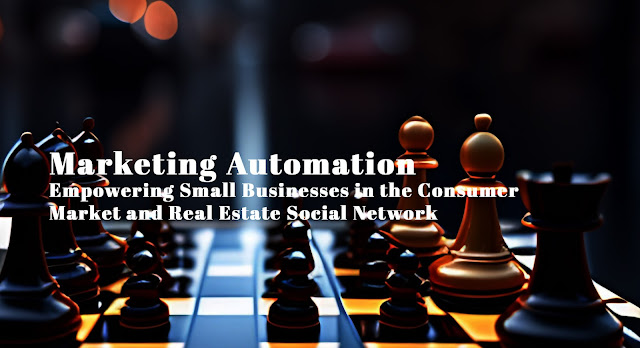In today’s fast-paced business landscape, the role of marketing has evolved significantly. For small businesses aiming to make a mark in the consumer market and real estate social network, leveraging marketing automation tools has become a crucial strategy.
This article explores the benefits, strategies, and challenges of implementing marketing automation for small businesses in these dynamic sectors.
Marketing Automation: Empowering Small Businesses in the Consumer Market and Real Estate Social Network
Table of Contents
- Introduction
- Understanding Marketing Automation
- The Significance for Small Businesses
- Navigating the Consumer Market4.1 The Changing Consumer Behavior
- 4.2 Personalization in Marketing
- Capitalizing on Real Estate Social Networks5.1 Building an Online Presence
- 5.2 Targeted Lead Generation
- Benefits of Marketing Automation6.1 Enhanced Efficiency and Time Savings
- 6.2 Improved Lead Management
- 6.3 Data-Driven Decision Making
- Crafting a Successful Strategy7.1 Defining Clear Objectives
- 7.2 Segmenting the Audience
- 7.3 Selecting the Right Tools
- Overcoming Challenges8.1 Initial Setup and Learning Curve
- 8.2 Maintaining Personalization
- 8.3 Adapting to Changes
- Case Studies9.1 Small Business Flourishes: A Success Story
- 9.2 Revolutionizing Real Estate Marketing
- Future Trends and Innovations10.1 AI and Predictive Analytics
- 10.2 Integration of IoT
- Conclusion
Marketing automation has become a game-changer for small businesses venturing into the consumer market and real estate social network. It involves using software and tools to automate repetitive marketing tasks, enabling businesses to focus on core strategies and customer interactions.
For small businesses in these competitive sectors, adopting marketing automation presents a myriad of benefits that can propel them toward growth and success.
Understanding Marketing Automation
At its core, marketing automation is the process of streamlining and automating marketing tasks, allowing businesses to deliver personalized content and experiences to their target audience. By harnessing the power of automation, businesses can create efficient workflows that nurture leads, improve customer engagement, and drive conversions.
The Significance for Small Businesses
Small businesses often operate with limited resources, making it challenging to execute comprehensive marketing campaigns. Marketing automation levels the playing field by providing tools that enhance efficiency and effectiveness. It enables small businesses to compete with larger players in the consumer market and real estate social network, offering a chance to reach a wider audience and make a lasting impression.
Navigating the Consumer Market
4.1 The Changing Consumer Behavior
In an era of information overload, consumers have become more discerning. They seek personalized experiences and relevant content. Marketing automation allows small businesses to tailor their messaging based on consumer preferences, increasing the likelihood of conversion.
4.2 Personalization in Marketing
Marketing automation platforms utilize data analytics to gather insights into customer behavior. By understanding their preferences, businesses can create personalized marketing campaigns that resonate with individual consumers. This personal touch can significantly improve customer loyalty and retention rates.
Capitalizing on Real Estate Social Networks
5.1 Building an Online Presence
Real estate is no longer confined to physical locations. Online platforms and social networks play a vital role in connecting buyers, sellers, and agents. Marketing automation assists real estate businesses in maintaining a strong online presence, ensuring they’re visible to potential clients.
5.2 Targeted Lead Generation
Marketing automation enables real estate professionals to identify and nurture potential leads. By analyzing online interactions, businesses can pinpoint prospects who are genuinely interested, allowing for more personalized engagement and a higher chance of conversion.
Benefits of Marketing Automation
6.1 Enhanced Efficiency and Time Savings
Automating marketing tasks reduces the need for manual intervention, saving valuable time for small business owners. This time can be redirected toward refining strategies and focusing on customer relationships.
6.2 Improved Lead Management
Marketing automation provides a centralized platform for lead management. It tracks interactions, monitors engagement, and categorizes leads based on their readiness to purchase, enabling businesses to prioritize effectively.
6.3 Data-Driven Decision Making
The data collected through marketing automation offers valuable insights into campaign performance. Small businesses can analyze this data to make informed decisions, optimizing their strategies for better results.
Crafting a Successful Strategy
7.1 Defining Clear Objectives
Before implementing marketing automation, businesses must establish clear objectives. Whether it’s increasing brand awareness, driving website traffic, or boosting sales, having defined goals will guide the automation strategy.
7.2 Segmenting the Audience
Segmentation allows businesses to create targeted campaigns for specific customer groups. By tailoring content to the needs and preferences of different segments, businesses can achieve higher engagement and conversion rates.
7.3 Selecting the Right Tools
Choosing the appropriate marketing automation tools is crucial. Small businesses should consider their specific requirements and budget constraints when selecting a platform that aligns with their goals.
Overcoming Challenges
8.1 Initial Setup and Learning Curve
Implementing marketing automation requires a learning curve. Small businesses must invest time in understanding the tools and setting up workflows. However, the long-term benefits outweigh the initial challenges.
8.2 Maintaining Personalization
Automation should not come at the cost of personalization. Striking the right balance between automated processes and personalized interactions is essential for building lasting customer relationships.
8.3 Adapting to Changes
The digital landscape is constantly evolving. Small businesses must be agile in adapting their automation strategies to match changing consumer behavior, technology advancements, and market trends.
Case Studies
9.1 Small Business Flourishes: A Success Story
XYZ Boutique, a small fashion retailer, embraced marketing automation to tailor its offerings to individual shopper preferences. This approach led to a 30% increase in repeat customers and a 25% rise in overall sales within six months.
9.2 Revolutionizing Real Estate Marketing
123 Realty used marketing automation to identify potential buyers actively engaging with their online listings. By sending personalized property recommendations, they achieved a 15% higher conversion rate compared to traditional methods.
Future Trends and Innovations
10.1 AI and Predictive Analytics
Artificial intelligence and predictive analytics will drive the next wave of marketing automation. Businesses can anticipate customer needs and behaviors, enabling them to deliver highly targeted content and experiences.
10.2 Integration of Iot
The Internet of Things (IoT) will enable businesses to gather real-time data from connected devices. This data can be harnessed to create hyper-personalized marketing campaigns, enhancing customer engagement.
Conclusion
In an increasingly competitive landscape, marketing automation has emerged as a lifeline for small businesses in the consumer market and real estate social network. By embracing automation, businesses can efficiently reach their target audience, nurture leads, and deliver personalized experiences that drive conversions. As technology continues to evolve, the synergy between marketing automation and small businesses will undoubtedly shape the future of marketing.
Frequently Asked Questions
-
What exactly is marketing automation?
Marketing automation refers to the use of software and tools to automate repetitive marketing tasks, streamlining processes and enhancing customer interactions.
-
Can marketing automation work for all small businesses?
Yes, marketing automation can be tailored to fit the needs of various industries and sizes of small businesses. It’s about customizing strategies based on specific goals.
-
How does marketing automation enhance customer engagement?
Marketing automation enables businesses to deliver personalized content and experiences, which resonate with customers on an individual level, fostering higher engagement.
-
Are there any potential drawbacks to using marketing automation?
While marketing automation offers numerous benefits, there can be challenges in terms of initial setup, maintaining personalization, and staying adaptable to changing trends.
-
What does the future hold for marketing automation?
The future of marketing automation lies in AI and predictive analytics, allowing for even more targeted and personalized marketing efforts, along with the integration of IoT to gather real-time data for campaigns.






